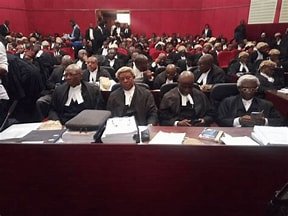Tensions ran high in Nigeria as the nation awaited a crucial ruling from the Appeal Court regarding the outcome of February’s presidential election.
After nearly 10 hours of deliberation, the judges announced their decision: Bola Tinubu’s victory would stand, and the challenges brought by his two main rivals, Atiku Abubakar of the Peoples Democratic Party and Peter Obi of the Labour Party, were deemed without merit.
This particular election had been the most hotly contested in Nigeria since the end of military rule in 1999. It featured three formidable candidates, with Mr. Tinubu ultimately winning with 37% of the votes, against 29% for Mr. Abubakar and 25% for Mr. Obi. Despite the legal contest, Mr. Tinubu was inaugurated as president on May 29th.
A spokesperson for President Tinubu expressed his satisfaction with the judgment, stating that he welcomed it “with a profound sense of responsibility and readiness to serve all Nigerians.” The spokesperson, Ajuri Ngelale, further noted that this verdict showcased the maturation of Nigeria’s legal system and the progress of Africa’s largest democracy, especially when democratic systems elsewhere on the continent are being tested.
The ruling, which came on the same day as President Tinubu’s 100th day in office, provides him with substantial relief. However, his opponents are expected to appeal to the Supreme Court.
The Labour Party has already rejected the verdict, with party spokesperson Obiora Ifoh stating in a local media report, “We reject the outcome of the judgment in its entirety due to the absence of justice.”
Nonetheless, the unanimous decision by the Appeal Court judges is likely to boost President Tinubu’s confidence. Surprisingly, he was not even in the country for Wednesday’s ruling, as he was attending the G20 summit in India.
Justice Haruna Tsammani, who announced the verdict, emphasized that the petitioners failed to substantiate their allegations of corrupt practices and over-voting. He also noted that the petitioners did not specify the polling units where they claimed rigging occurred, failed to provide credible evidence to support their allegations of vote suppression in their strongholds, and that the electoral commission was not obligated to transmit results electronically. He further clarified that failure to upload photographic copies of polling unit results in real time did not invalidate the election.
The judgment delivered by the Appeal Court brings an end to a period of uncertainty and anxiety in Nigeria, and while it may not satisfy all parties, it represents a significant milestone in the country’s democratic journey.

